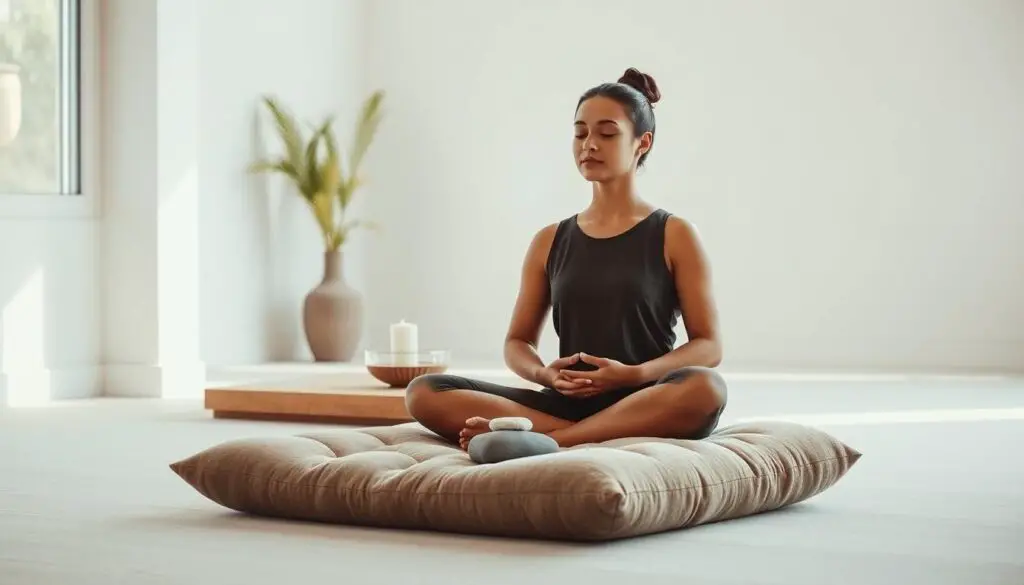
You can start living more peacefully with simple daily practices that reduce stress and boost focus. Many people think mindfulness practices are hard or take too much time. But, it’s actually quite simple.
Adding mindful living to your daily life can make you feel better overall. Simple mindfulness practices can help you stay focused and calm, even during stressful or overwhelming times.
What is mindfulness, and how does it differ from meditation?
Mindfulness means being fully present in the moment. It involves noticing your thoughts, feelings, and body sensations without judgment. Meditation is a way to practice mindfulness, but they’re not the same. Mindfulness can be done in everyday life, while meditation is often done in a special setting.
Key Takeaways
- Simple mindfulness practices can reduce stress and improve focus.
- Incorporating mindful living into daily routines is easier than you think.
- Mindfulness tips can improve overall well-being.
- Daily mindfulness practices can help you stay calm and focused.
- Starting mindfulness practices is simple and doesn’t require a lot of time.
Understanding Mindfulness: The Foundation of Present-Moment Awareness

Mindfulness is all about being aware of the present moment. It helps you notice your thoughts, feelings, and body sensations without judgment. This way, you can stop living on autopilot and start living in the now.
What Mindfulness Really Means
Mindfulness is a form of meditation that makes you intensely aware of your senses and feelings in the moment. It’s about being in the present, observing your experiences with curiosity. You focus on your breath, body, or emotions as they come up.
The Science Behind Mindfulness
Studies show that mindfulness is good for your body and mind. It can lower stress, anxiety, and depression. It also helps you sleep better and think clearer. Mindfulness changes how your brain and body work, showing its benefits.
Distinguishing Mindfulness from Meditation
Mindfulness and meditation are related but different. Meditation is a wide term for practices that calm the mind and clear emotions. Mindfulness is a meditation that focuses on being present. Knowing the difference helps you use them in your life better.
| Aspect | Mindfulness | Meditation |
|---|---|---|
| Focus | Present-moment awareness | Varies (e.g., focus on breath, mantra, visualization) |
| Goal | Cultivate awareness and acceptance | Achieve mental clarity and calm |
The Transformative Benefits of Mindfulness Practice

Regular mindfulness practice can change your life for the better. Studies show it reduces stress, anxiety, and depression. It also boosts overall well-being.
Physical Health Improvements
Mindfulness is good for your body too. It may help lower blood pressure and reduce certain types of chronic pain, while potentially supporting immune function. In some cases, it can also ease insomnia and contribute to better sleep quality. This is thanks to its ability to manage pain and increase pain tolerance.
| Physical Health Benefit | Description |
|---|---|
| Lower Blood Pressure | Regular mindfulness practice can help reduce hypertension. |
| Reduced Chronic Pain | Mindfulness can help manage pain by increasing the brain’s pain tolerance. |
| Improved Sleep | Mindfulness practices can lead to better sleep quality and duration. |
Mental and Emotional Well-being
Mindfulness is great for your mind and emotions.It can help reduce anxiety and depression while boosting mood and emotional balance. You’ll also gain greater self-awareness and a stronger sense of acceptance. Mindfulness changes your brain, making you more attentive and emotionally stable.
Enhanced Relationships and Social Connections
Mindfulness also improves your relationships. It makes you more present and empathetic. This leads to stronger, more meaningful connections with others.
Essential Mindfulness Tips for Beginners

Starting your mindfulness journey is exciting. It’s all about being in the moment. With practice, you can improve your well-being.
Starting Small: The One-Minute Meditation
Start with a one-minute meditation. Focus on your breath or a mantra for a minute. This is a great way to begin.
Find a quiet spot and sit comfortably. Close your eyes and focus on your breath. When your mind wanders, gently bring it back. This helps you stay present.
Finding Your Anchor: Breath, Body, and Sound
An anchor helps keep your focus. You can use your breath, body sensations, or sounds. Choose what works best for you.
Try different anchors to see what suits you. For example, feeling your feet on the ground can ground you. Or, listening to sounds can keep you mindful.
| Anchor | Description | Benefits |
|---|---|---|
| Breath | Focus on the sensation of breathing | Calms the mind, reduces stress |
| Body | Notice sensations, tension, or relaxation | Increases body awareness, releases tension |
| Sound | Listen to surrounding noises or music | Enhances awareness of the environment, promotes calm |
Common Challenges and How to Overcome Them
You might face challenges like a wandering mind. Recognizing these is the first step. Be patient and persistent to overcome them.
Start small and be consistent. Begin with short exercises and increase time as you get more comfortable. A mindfulness community or guide can also help.
Morning Mindfulness Practices to Start Your Day Right
Morning mindfulness practices can change your daily life for the better. They help improve your mental health. By starting your day with mindfulness, you can feel more positive.
Mindful Waking Rituals
Start with mindful waking rituals. When your alarm rings, breathe deeply and feel your body wake up. Notice your feet on the ground or the air on your skin.
Setting a daily intention is also powerful. Think about what you want to do and feel today. This keeps you focused and calm.
Intentional Morning Routines
Creating a mindful morning routine is key. Do things one at a time, like drinking water or brushing teeth, fully present. Pay attention to what you see, smell, and feel.
Using mindfulness techniques in your morning boosts your mental clarity. It prepares you for the day.
Mindful Breakfast and Planning
Eating a mindful breakfast is a great mindfulness practice. Notice the flavors, textures, and smells of your food. Eat slowly and enjoy each bite.
When planning your day, think about your tasks and how to apply mental wellness tips. This helps you stay on track and lowers stress.
Adding these morning mindfulness practices to your routine can greatly improve your well-being. It sets you up for success.
Incorporating Mindfulness Into Your Workday
Mindfulness can greatly improve your focus and reduce stress at work. By adding mindfulness to your daily routine, you can boost your productivity and well-being. It’s about being fully present, making thoughtful choices, and being aware. This awareness can lead to better work results.
Mindful Transitions Between Tasks
Switching between tasks can often distract you, lowering your productivity. Mindfulness during these changes can keep you focused. Take a few deep breaths, observe your surroundings, or just pause before starting the next task. This simple act can help you stay present and focused.
- Pause for a few deep breaths before starting a new task.
- Notice the sensations in your body as you transition.
- Use a mindful phrase to signal the start of a new task.
Desk-Based Mindfulness Exercises
You can practice mindfulness right at your desk. Simple actions like stretching, focusing on your breath, or feeling your feet on the ground can be done quietly. These activities can ease tension and sharpen your focus.
- Stretch your arms overhead and take a deep breath.
- Notice the sensation of your feet on the ground.
- Practice a quick body scan to release tension.
Managing Workplace Stress Through Mindfulness
Workplace stress is common, but mindfulness can help manage it. Being more aware of your thoughts and feelings helps you handle stress better. Regular mindfulness practice can improve how you handle emotions and build resilience.
Mindful habits like meditation or mindful breathing can lower stress. Adding these to your workday can make it more balanced and productive.
By making mindfulness a part of your workday, you’ll see many benefits. These include better focus, productivity, and stress management. Begin with small, mindful habits and grow your practice for a more fulfilling work experience.
Practical Mindfulness Tips for Daily Stress Reduction
You can reduce daily stress by adding simple mindfulness tips to your routine. Mindfulness helps you focus on the present and ignore negative thoughts. It brings calm and clarity, even in tough times.
The STOP Method for Immediate Stress Relief
The STOP method is a handy mindfulness trick for any situation. It means Stop, Take a breath, Observe, and Proceed. When stressed, stop, breathe deeply, notice your thoughts without judgment, and then act calmly.
Body Scan Meditation for Tension Release
Body scan meditation is a mindfulness exercise. You start at your toes and move up to your head, focusing on each part. Release tension as you go. It makes you more aware of your body and reduces stress.
Mindful Breathing Patterns for Anxiety
Mindful breathing is a key mindfulness tip. Focus on your breath, noticing air in and out of your nose. Try the 4-7-8 method for calming. Breathe in for 4, hold for 7, and out for 8. It calms your nerves and lowers anxiety.
Using these mindfulness tips daily can make you more resilient to stress. Regular practice improves emotional control, focus, and well-being. Mindfulness is a valuable tool for handling life’s challenges with ease.
Mindful Eating: Transforming Your Relationship with Food
By paying attention to how you eat, you can make a positive change. Mindful eating helps you enjoy your meals more. It also leads to a healthier diet.
The Principles of Mindful Eating
Mindful eating has a few key points. First, eat slowly and savor your food. This lets you fully enjoy the taste and texture.
Second, listen to your body’s hunger and fullness signals. Eat when you’re hungry and stop when you’re full. This helps you eat more intuitively.
Practical Exercises for Mealtime Awareness
To practice mindful eating, choose one meal a day to eat without distractions. Turn off the TV and put away your phone. Eat small bites and chew slowly.
Notice the sensations in your mouth and the flavors of your food. Try the “raisin exercise” to focus on the texture, taste, and smell of a raisin. These exercises help you enjoy your food more.
Overcoming Mindless Eating Habits
Mindless eating, like eating in front of the screen, can be hard to stop. But, by becoming more aware, you can change. Identify what triggers mindless eating and find ways to manage it.
Try eating more slowly or finding other activities when you’re not hungry. By making these changes, you can transform your relationship with food. This practice not only nourishes your body but also improves your overall well-being. It aligns with the benefits of mindfulness practices.
Evening Mindfulness Rituals for Better Sleep
As the day ends, adding mindfulness to your evening can boost your sleep. Mindfulness meditation in the evening calms your mind and body. It gets you ready for a good night’s sleep. A mindfulness mindset helps you handle thoughts and feelings better, improving your well-being.
Creating a Mindful Bedtime Routine
Having a regular bedtime routine is key. It tells your body it’s time to sleep. Add mindfulness like gentle stretches, deep breathing, or a short meditation to your routine. These actions relax your muscles and calm your mind, making sleep easier.
- Dim the lights to create a sleep-conducive environment
- Practice gentle stretches or yoga to release tension
- Engage in deep breathing exercises to calm your mind
Letting Go of the Day’s Thoughts
It’s hard to sleep when you’re thinking about the day. Mindfulness helps you let go of these thoughts. Acknowledge your thoughts without judgment and focus on your breath or a calming mantra. This clears your mind and lowers stress.
- Identify your thoughts and acknowledge them without judgment
- Gently refocus your attention on your breath or a calming phrase
- Practice this technique regularly to improve your ability to let go of distracting thoughts
Guided Sleep Meditations and Relaxation Techniques
Guided sleep meditations are great for relaxing and falling asleep. They use visualization, deep breathing, or muscle relaxation. You can find these online or through sleep apps.
Adding these evening mindfulness rituals to your routine can greatly improve your sleep. You’ll wake up feeling refreshed and ready to go.
Conclusion: Cultivating a Lifelong Mindfulness Practice
Adding simple mindfulness practices to your daily routine can change your life. You’ll notice more awareness, clarity, and calm. This is the power of mindful living.
Keep track of your progress by writing in a journal each day. Reflecting on your experiences can reveal patterns and insights. Seeing the benefits will motivate you to keep practicing, making your life more mindful and fulfilling.
Embracing mindful living helps you face life’s challenges with ease. Remember, small changes can lead to big benefits over time. With patience and dedication, you’ll unlock mindfulness’s full power, enjoying a more balanced and harmonious life.
FAQ
What is mindfulness, and how does it differ from meditation?
How can mindfulness benefit my physical health?
What are some simple mindfulness exercises for beginners?
How can I incorporate mindfulness into my workday?
What is mindful eating, and how can I practice it?
Can mindfulness help with stress and anxiety?
How can I make mindfulness a habit?
What are some evening mindfulness rituals that can help improve sleep?
Share :
You Might Also Like







